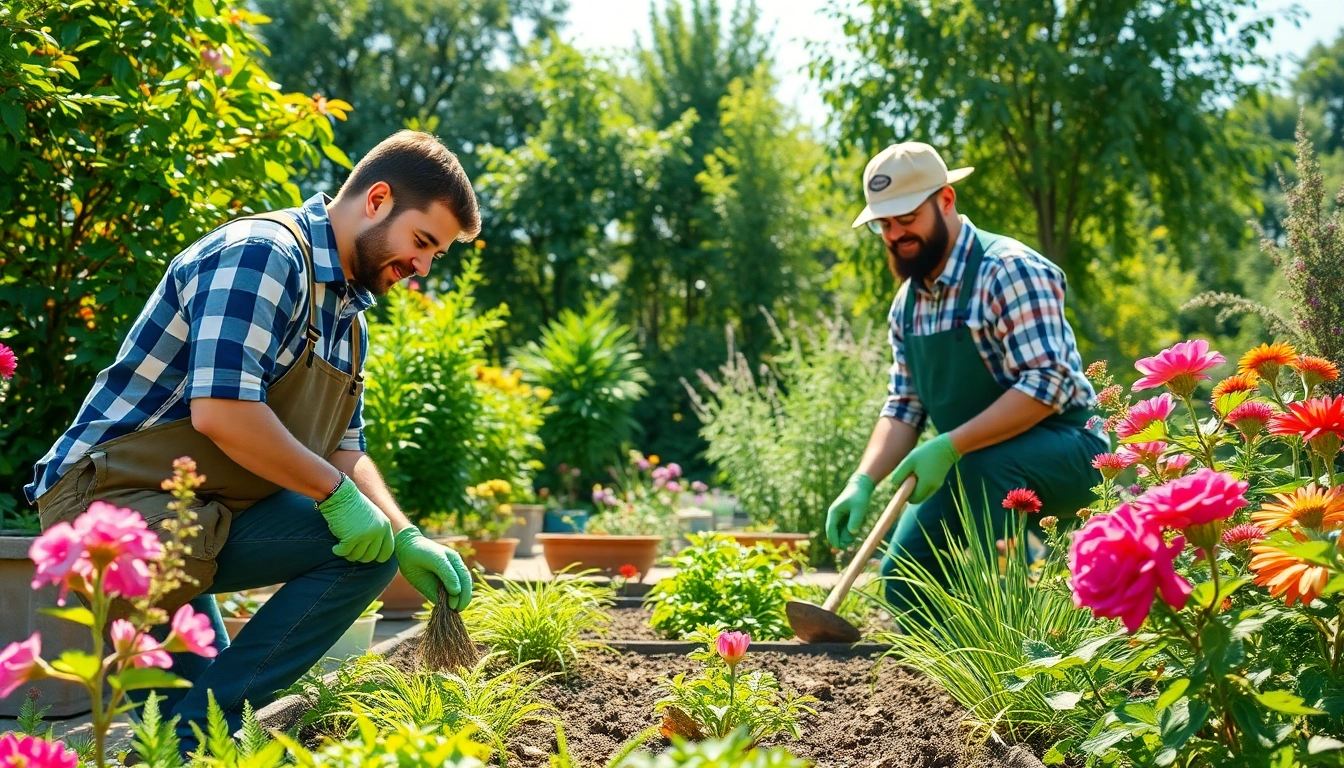Understanding Garden Maintenance Services
What is Garden Maintenance?
Garden maintenance refers to the ongoing care and management of a garden to ensure it remains healthy, attractive, and functional. This can encompass a wide range of activities, from simple tasks like mowing the lawn and weeding to more complex procedures such as garden design and pest management. A professional garden maintenance service typically offers tailored approaches based on the specific needs of each garden, adapting their tasks to suit seasonal changes and environmental conditions.
Benefits of Professional Garden Care
Investing in professional garden maintenance comes with several significant benefits:
- Expertise: Professionals bring a wealth of knowledge regarding plant species, pest management, and sustainable practices. They are equipped to tackle problems that may be beyond the skills of an average gardener.
- Time-saving: Many homeowners lead busy lives, and hiring a service allows for the liberation of time, enabling clients to focus on enjoyment rather than maintenance.
- Consistency: Regular maintenance ensures that gardens remain in top shape throughout the year, adapting to seasonal requirements and challenges.
- Value addition: A well-maintained garden can significantly increase property value, enhancing its aesthetic appeal and marketability.
- Customized Care: Providers can tailor services to align with the unique needs of various gardens, considering plant types, soil quality, and environmental factors.
Common Services Offered
Garden maintenance services vary widely, but some of the most common offerings include:
- Lawn care: Mowing, aerating, fertilizing, and weed control are essential to maintaining a healthy lawn.
- Pruning and trimming: This involves caring for trees, shrubs, and flowering plants to promote healthier growth and maintain shape.
- Pest and disease control: Regular inspections and treatments for pest infestations and diseases to keep plants healthy.
- Soil management: Testing soil health, amending soil quality, and ensuring proper drainage.
- Seasonal clean-up: Clearing debris from gardens, cutting back perennials, and preparing gardens for winter or spring.
Choosing the Right Garden Maintenance Service
Assessing Your Garden’s Needs
Before seeking professional help, assess your garden’s specific needs. Begin by evaluating:
- Size and layout: Larger gardens will require more maintenance than smaller ones, which can affect service pricing and scope.
- Existing plants and features: Identify the types of plants you have—some may require special care, while lawns may need different treatments.
- Your personal goals: Determine what you want from your garden—beauty, utility, or perhaps sustainability.
Comparing Service Providers
Once you are clear about your garden’s needs, begin comparing different providers. Consider the following factors:
- Experience and reputation: Look for reputable services with positive customer reviews and a proven track record.
- Services offered: Ensure that the service providers you consider can meet your specific maintenance requirements.
- Pricing structure: Understand how pricing works—whether it’s fixed pricing or based on the scope of work—providing value for the services offered.
- Certifications and licenses: Ensure that the company has the necessary certifications for horticultural practices and local regulations.
Questions to Ask Before Hiring
Engaging with potential maintenance providers can ensure you make an informed choice. Here are some key questions to ask:
- What are your qualifications and experience in garden maintenance?
- Can you provide references or testimonials from past clients?
- What specific services do you include in your maintenance packages?
- How do you handle pest and disease management, and what products do you use?
- What is your pricing model, and are there any additional costs I should be aware of?
Key Techniques for Effective Garden Maintenance
Seasonal Care Practices
Effective garden maintenance requires seasonal adaptations. Here are key practices for each season:
- Spring: Time for planting, fertilizing, and applying mulch. It’s also crucial to address any winter damage.
- Summer: Focus on watering, weeding, and pest control. Applying organic mulch can help retain moisture.
- Fall: This is the time for planting bulbs and perennials, as well as clearing debris and preparing for winter.
- Winter: Focus on protecting sensitive plants, planning for the upcoming year, and ensuring that tools are properly stored.
Pest and Disease Management
Healthy gardens can be affected by pests and diseases. Comprehensive management includes:
- Regular inspections: Monitor plants for any signs of distress or damage, which is crucial for early detection.
- Integrated pest management (IPM): Employing a holistic approach that combines biological, cultural, and chemical practices to manage pests sustainably.
- Healthy soil practices: Maintaining soil health can reduce susceptibility to pests and diseases by promoting vigorous plant growth.
Soil and Plant Health Maintenance
A healthy garden starts with good soil. Key practices include:
- Soil testing: Regularly test the pH and nutrient levels of the soil to inform necessary amendments.
- Adding organic matter: Techniques such as composting enrich the soil and improve drainage.
- Proper watering: Ensure that plants receive the correct amount of moisture without over or under-watering, which can lead to stress or disease.
Tools and Equipment for Garden Maintenance
Essential Tools Every Gardener Should Have
To succeed in garden maintenance, having the right tools is essential. Here’s a roundup of must-have equipment:
- Hand tools: Basics like pruners, rakes, and trowels should be present in every gardener’s toolkit.
- Lawn mowers: Depending on the size of your lawn, an appropriate mower is necessary for maintaining lawn height.
- Shovels and spades: Versatile tools for digging, turning soil, or planting small trees and shrubs.
- Watering equipment: Hoses, watering cans, and irrigation systems to ensure proper hydration of your plants.
How to Use Garden Tools Effectively
Using garden tools correctly maximizes efficiency and results:
- Regular maintenance: Keep tools sharp and clean to ensure optimal performance.
- Proper technique: Learn the correct ways to handle tools; for example, using a wrist motion, not arm strength, for pruners helps maintain a steady cut.
- Ergonomics: Use ergonomic tools or equipment to reduce strain on your back and joints during extended use.
Equipment for Specialized Services
Depending on the scope of garden maintenance, some specialized equipment might be needed, including:
- Chippers and shredders: Useful for reducing garden waste and creating mulch.
- Sprayers: Essential for applying fertilizers or pesticides effectively and evenly.
- Soil testers: Help in assessing nutrient levels and pH for informed soil management.
Measuring the Success of Your Garden Maintenance
Indicators of a Healthy Garden
A successful garden shows clear signs of health and vitality, which include:
- Lush growth: Plants that are thriving, flowering, or yielding fruits and vegetables.
- Soil health: Loose soil that retains moisture without becoming soggy indicates proper balance.
- Diversity: A variety of healthy plants can indicate a well-maintained ecosystem.
Feedback and Adjustments with Service Providers
Continuously communicating with your garden service provider is vital. Regular feedback ensures that:
- Adjustments can be made based on changing garden needs and seasonal challenges.
- Better strategies can be implemented for pest management and plant care.
- Clients are happy with the visual appeal and ongoing health of their garden, leading to a long-term partnership.
Long-term Care Strategies
To ensure the longevity of your garden’s health and beauty:
- Seasonal planning: Plan maintenance tasks ahead for different seasons to avoid neglect.
- Regular evaluations: Schedule periodic assessments of plant health and soil quality.
- Invest in quality plants: Choose resilient and well-suited plants for your environment to reduce long-term care needs.



